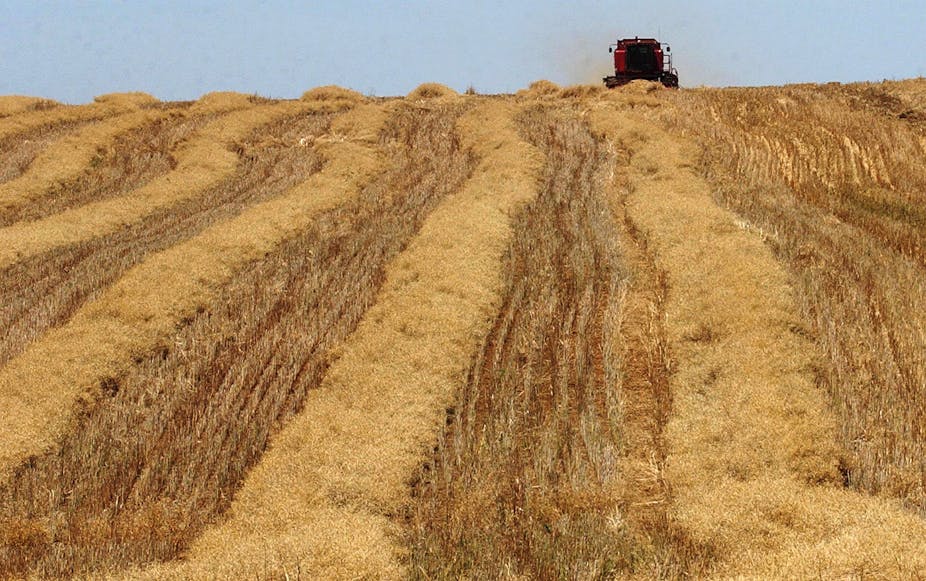Greens leader Bob Brown’s concern over acquisitions by China’s Shenhua Watermark Coal of farms on NSW’s Liverpool Plains is but the latest flurry in a gathering storm of controversy over mining developments on farmland.
Whether it’s coal seam gas or coal, the question is whether the loss of some of our most productive farmland to mining threatens national food security.
World Vision’s Tim Costello takes a broader view and asserts that there is a global “ethical interest” involved.
Should we be worried?
Food security? It’s in the (free market) bag
According to the Australian Bureau of Agricultural and Resource Economics and Sciences (ABARES), we shouldn’t be concerned. It recently concluded that “Australia is able to produce sufficient food to meet its needs and has the income to achieve national food security. Australia’s prosperity, coupled with its participation in the global economy, will ensure this food security for the foreseeable future.”
This neatly summarises two important aspects of the official view in relation to Australia’s food security.
First, we currently export 60% of the food we produce, with total production providing enough food for about 60 million people. Even taking into account projected population growth to 2050 our food supply is safe.
Second, there is no need to link food security to domestic production. As long as we are cashed up, our participation in a global food market will allow us to buy whatever we need.
And the global interest? According to ABARES: “Australia has a role in global food security but this is not principally in producing food for the world’s food deficit countries. Australia will feed far more of the world’s poor by providing technical assistance that helps them in feeding themselves, thereby enhancing their economic development and thus their ability to afford food.”
Certainly claims that Australia can be the “food bowl of Asia” are exaggerated. Our wheat exports account for a mere 2% of global consumption.
But more profoundly, and again quoting ABARES, “Australia’s food exports are not oriented towards countries with serious food security problems. […] The incentive is for farmers and exporters to supply the markets where they receive the highest returns for their products.”
Common to both these arguments is of course market logic, according to which food security is linked only indirectly to food production, with purchasing power in the mediating role.
It’s the famous invisible hand, balancing supply and demand, and in theory maximizing utility for everyone by directing productive resources to their most profitable use. Fossil fuel extraction easily out-competes food production in this calculus.
And when markets fail?
So what happens in 30 years’ time when both domestic and international food demand have increased substantially, and perhaps the price signals have changed?
In the interim, chunks of our best agricultural land have been dug up, water supplies have been depleted or polluted, and we (and all other producers in the global market) are struggling to maintain food production under the challenges of changing climate, peak oil and peak phosphorus.
There’s an irreversibility here that does not feature in market calculus.
The Shenhua Watermark project is planned to provide coal for 30 years.
The agricultural land it will destroy – some of the finest in the world – could grow food for millennia. It is effectively irreplaceable.
A National Food Plan
It’s in conditions of market failure that astute regulation is essential. This sounds like just the kind of national interest question that the National Food Plan promised by the ALP in the lead up to the 2010 election should address. On current indications this appears unlikely.
In the _Issues paper to inform development of a national food plan _ released last month the federal government labels it a planning issue for others to manage.
“The Australian Government encourages state and local governments to pursue policies that provide a sensible basis for managing competing land uses.”
As part of developing the plan, the issues paper asks stakeholders for feedback on 48 specific questions. How land use conflict should be addressed is not one of them.
But the conflict is obvious. Local and state governments are constantly under budget pressure. The major investment that comes with mining projects will always be enticing.
Addressing the issue of national and global food security requires more than a faith in markets and current planning policies. It is a legitimate question of national interest and ethical responsibility.
The National Food Plan should do more than “encourage”. It should require state governments to preserve our best agricultural land as an investment in the future.

